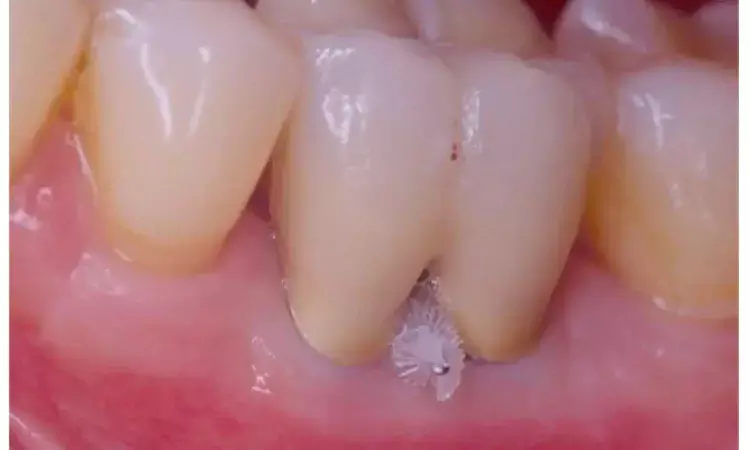- Home
- Medical news & Guidelines
- Anesthesiology
- Cardiology and CTVS
- Critical Care
- Dentistry
- Dermatology
- Diabetes and Endocrinology
- ENT
- Gastroenterology
- Medicine
- Nephrology
- Neurology
- Obstretics-Gynaecology
- Oncology
- Ophthalmology
- Orthopaedics
- Pediatrics-Neonatology
- Psychiatry
- Pulmonology
- Radiology
- Surgery
- Urology
- Laboratory Medicine
- Diet
- Nursing
- Paramedical
- Physiotherapy
- Health news
- Fact Check
- Bone Health Fact Check
- Brain Health Fact Check
- Cancer Related Fact Check
- Child Care Fact Check
- Dental and oral health fact check
- Diabetes and metabolic health fact check
- Diet and Nutrition Fact Check
- Eye and ENT Care Fact Check
- Fitness fact check
- Gut health fact check
- Heart health fact check
- Kidney health fact check
- Medical education fact check
- Men's health fact check
- Respiratory fact check
- Skin and hair care fact check
- Vaccine and Immunization fact check
- Women's health fact check
- AYUSH
- State News
- Andaman and Nicobar Islands
- Andhra Pradesh
- Arunachal Pradesh
- Assam
- Bihar
- Chandigarh
- Chattisgarh
- Dadra and Nagar Haveli
- Daman and Diu
- Delhi
- Goa
- Gujarat
- Haryana
- Himachal Pradesh
- Jammu & Kashmir
- Jharkhand
- Karnataka
- Kerala
- Ladakh
- Lakshadweep
- Madhya Pradesh
- Maharashtra
- Manipur
- Meghalaya
- Mizoram
- Nagaland
- Odisha
- Puducherry
- Punjab
- Rajasthan
- Sikkim
- Tamil Nadu
- Telangana
- Tripura
- Uttar Pradesh
- Uttrakhand
- West Bengal
- Medical Education
- Industry
Furcation involvement in molars strongly associated with molar loss

Furcation involvement in the molars is strongly associated with molar loss suggests a recent study published in the Journal of Clinical Periodontology
An individualized approach to dental and periodontal care requires a detailed understanding of factors relevant for future events. In an attempt to predict tooth survival over the long term, multiple prognostic tools have been developed and validated in selected populations. Among tooth-related parameters, furcation status has been identified as a highly relevant factor. The available evidence, however, originates from studies performed on small populations followed in specialist care. Corresponding assessments in large populations with high external validity are lacking.
This registry-based retrospective cohort study aimed to evaluate the impact of furcation status on the risk for molar loss.
Subjects with and without furcation involvement (FI) in 2010/2011 were identified in a nationwide registry in Sweden (age- and gender-matched sample: 381,450 subjects; 2,374,883 molars). Data on dental and periodontal status were extracted for the subsequent 10-year period. Impact of Furcation involvement (at baseline or detected during follow-up) on molar loss (i.e., tooth extraction) was evaluated through multilevel logistic regression and survival analyses.
Results
• Furcation involvement had a significant impact on molar loss.
• Furcation involvement degrees 2 and 3 resulted in adjusted risk ratios of 1.67, respectively. Following the first detection of deep Furcation involvement (degrees 2–3), estimated survival decreased by 4% at 5 years and 8% at 10 years.
• In addition to Furcation involvement, endodontic status and probing depth were relevant risk factors for molar loss.
Furcation status had a clinically relevant impact on the risk for molar loss. However, after first detection of deep Furcation involvement, the decline in molar survival was minor.
Reference:
Trullenque-Eriksson, A., Tomasi, C., Petzold, M., Berglundh, T., & Derks, J. (2022). Furcation involvement and tooth loss: A registry-based retrospective cohort study. Journal of Clinical Periodontology, 1– 9. https://doi.org/10.1111/jcpe.13754
Keywords:
Journal of Clinical Periodontology, tooth loss, Trullenque-Eriksson, A., Tomasi, C., Petzold, M., Berglundh, T., & Derks, J, Furcation involvement
Dr. Shravani Dali has completed her BDS from Pravara institute of medical sciences, loni. Following which she extensively worked in the healthcare sector for 2+ years. She has been actively involved in writing blogs in field of health and wellness. Currently she is pursuing her Masters of public health-health administration from Tata institute of social sciences. She can be contacted at editorial@medicaldialogues.in.
Dr Kamal Kant Kohli-MBBS, DTCD- a chest specialist with more than 30 years of practice and a flair for writing clinical articles, Dr Kamal Kant Kohli joined Medical Dialogues as a Chief Editor of Medical News. Besides writing articles, as an editor, he proofreads and verifies all the medical content published on Medical Dialogues including those coming from journals, studies,medical conferences,guidelines etc. Email: drkohli@medicaldialogues.in. Contact no. 011-43720751


